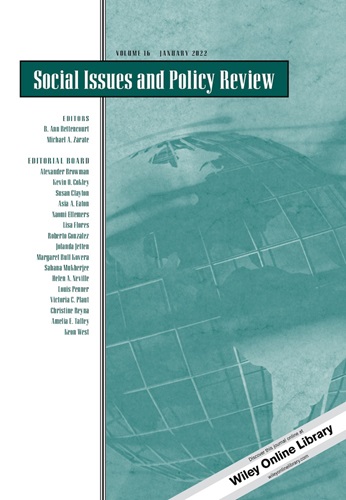Feeling at Home in College: Fortifying School‐Relevant Selves to Reduce Social Class Disparities in Higher Education
IF 5.6
1区 心理学
Q1 PSYCHOLOGY, SOCIAL
引用次数: 116
Abstract
Social class disparities in higher education between working-class students (i.e., students who are low income and/or do not have parents with four-year college degrees) and middle-class students (i.e., students who are high income and/or have at least one parent with a four year-degree) are on the rise. There is an urgent need for interventions, or changes to universities' ideas and practices, to increase working-class students' access to and performance in higher education. The current article identifies key factors that characterize successful interventions aimed at reducing social class disparities, and proposes additional interventions that have the potential to improve working-class students' chances of college success. As we propose in the article, effective interventions must first address key individual and structural factors that can create barriers to students' college success. At the same time, interventions should also fortify school-relevant selves, or increase students' sense that the pursuit of a college degree is central to “who I am.” When students experience this strong connection between their selves and what it means to attend and perform well in college, they will gain a sense that they fit in the academic environment and will be empowered to do what it takes to succeed there.在大学里有家的感觉:强化与学校相关的自我,减少高等教育中的社会阶级差距
在高等教育中,工人阶级学生(即低收入学生和/或没有父母拥有四年制大学学位的学生)和中产阶级学生(即高收入学生和/或至少有一方父母拥有四年制大学学位的学生)之间的社会阶级差距正在扩大。迫切需要进行干预,或改变大学的理念和做法,以增加工薪阶层学生接受高等教育的机会和表现。本文确定了旨在减少社会阶级差异的成功干预的关键因素,并提出了有可能提高工薪阶层学生大学成功机会的额外干预措施。正如我们在文章中提出的那样,有效的干预必须首先解决可能对学生的大学成功造成障碍的关键个人和结构因素。与此同时,干预措施也应该强化与学校相关的自我,或者增强学生的意识,即追求大学学位是“我是谁”的核心。当学生体验到他们的自我和在大学里表现良好的意义之间的这种强烈联系时,他们将获得一种适应学术环境的感觉,并将被授权去做在那里取得成功所需要的事情。
本文章由计算机程序翻译,如有差异,请以英文原文为准。
求助全文
约1分钟内获得全文
求助全文
来源期刊

Social Issues and Policy Review
Multiple-
CiteScore
22.20
自引率
1.10%
发文量
9
期刊介绍:
The mission of Social Issues and Policy Review (SIPR) is to provide state of the art and timely theoretical and empirical reviews of topics and programs of research that are directly relevant to understanding and addressing social issues and public policy.Papers will be accessible and relevant to a broad audience and will normally be based on a program of research. Works in SIPR will represent perspectives directly relevant to the psychological study of social issues and public policy. Contributions are expected to be review papers that present a strong scholarly foundation and consider how research and theory can inform social issues and policy or articulate the implication of social issues and public policy for theory and research.
 求助内容:
求助内容: 应助结果提醒方式:
应助结果提醒方式:


